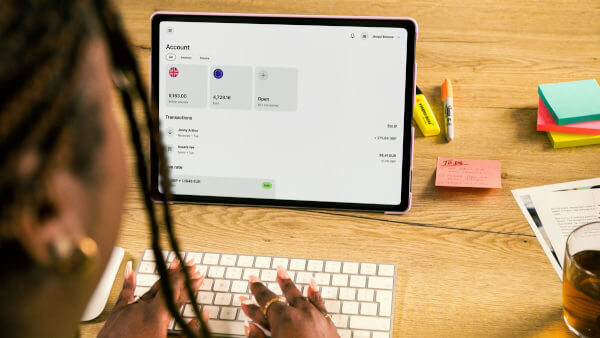Wise ACH vs wire guide
Everything you need to know about using Wise for USD transfers and paying via ACH vs wire

If you’ve ever wondered what a foreign transaction fee is, you’re in the right place. Read on for what it is, how it works, how to avoid them and much more.
A foreign transaction fee is the charge added by your bank or card provider when you make a payment in a different currency.
Not all credit or debit cards apply a foreign transaction fee for international payments, but if this happens, it can increase the price of your purchase — so make sure you read the terms and conditions before signing up for a new card.
| Check out our review of the best no foreign transaction fee credit cards |
|---|
Intl txn fee — short for international transaction fee — is the same as a foreign transaction fee. Some banks, such as TD Bank, opt to indicate their charges by using this expression.
You may also find cross border fees being used instead of foreign or international transaction fees. Regardless of how it’s written, if you enjoy traveling or spending money internationally, this is definitely something to keep an eye on.
Foreign transaction fees are usually in the region of 3% which is added onto the costs of your spending whenever you transact in a foreign currency.
This fee may be split between the card network — like Visa, Mastercard or American Express — and the card issuer — usually your bank. Foreign transaction fees can be applied to both credit and debit cards.
When you spend with a merchant or make a withdrawal overseas you may be asked if you’d rather pay in USD instead of the local currency wherever you are, using a service called dynamic currency conversion (DCC).
On the face of it, this might sound like a handy way to see exactly what you’re paying upfront, and maybe even beat foreign transaction fees altogether. Unfortunately it is not.
When you pay in the local currency, the exchange rate you’ll get is set by the card network — and usually pretty reasonable.
DCC rates are set by the merchant and can include inflated fees — which means that even once you take foreign transaction fees into account, paying in the local currency is usually cheaper.
If foreign transaction fees apply to your card, you’ll pay them whenever you spend in a foreign currency.
This may be when you pay for things or make withdrawals when you’re abroad — or it could be when you’re shopping online with international retailers.
It can be tricky to be sure if an online retailer you’re using is based abroad, or if they route their payments via an overseas bank.
Check the site’s ‘contact’ and ‘about’ pages to see if the location of the business is listed — if you’re not sure, you might want to get in touch with the seller, to double check.
| 💡 Spend money abroad like a local with the Wise card |
|---|
Foreign transaction fees will be shown on your credit or debit card statement, often as a separate line to the purchase you made. The charge will be made on the day the payment is processed — which may be a day or two later than the actual transaction.
Of course, you don’t need to wait until after you’ve been charged, to understand the lay of the land. You can also check your card terms and conditions in advance, to see whether or not a foreign transaction fee will be added to your international purchases.
If you’re spending with overseas retailers and using your credit or debit card, there are a few other fees you need to consider.
Exchange rate markups. Sometimes banks add a markup on the exchange rate used for sending or spending money abroad. Make sure to compare it to the mid-market exchange rate to make sure you’re not being ripped off by hidden fees.
International ATM withdrawal fees. Some debit and credit cards will charge if you choose to withdraw local cash from an ATM while you’re overseas. It pays to check your card conditions before you travel — and ask your local branch if your bank has partner institutions abroad or is part of an ATM network like the Global Alliance. You might find that you can get fee free, or reduced cost ATM withdrawals by using your home bank’s partner institutions abroad.
Dynamic Currency Conversion (DCC). When using an ATM or paying by card abroad, oftentimes you get a message asking in which currency you’d like to pay. Though it might seem convenient to pay in USD, you should always choose the local currency, this way you can avoid the DCC, a currency conversion rate added by the payment processor.
Credit card cash advance fees. Using your credit card in an ATM at home or abroad can mean you pay extra fees. In many cases there is a cash advance fee to pay and extra costs for currency conversion if you’re overseas. You may also start to incur interest charges on your withdrawal immediately, even if regular purchases have a grace period.
Don’t pay more than you have to when traveling. Here are a few great tips, which could save you money on charges and fees.
It’s always a smart idea to have more than one way to pay for your travels when you’re abroad. Using your card might be convenient, but having a stock of local currency is also a great way to avoid foreign transaction fees and can be handy if you find yourself in an area where card acceptance is limited. Avoid hotel and airport currency exchange booths which often have poor exchange rates, to make your dollars go further.
Not all cards charge international transaction fees. Make sure to check the fee schedule of your bank or card provider to make sure you use the right one for overseas purchases.
| 💳 Meet the Wise debit card |
|---|
|
Please see Terms of Use for your region or visit Wise Fees & Pricing for the most up to date pricing and fee information.
Finally, it’s usually a good idea to avoid using your credit card when you need to withdraw cash from an ATM. This is often expensive with cash advance fees and interest to pay immediately.
Foreign transaction fees can come as a surprise — especially if you get caught out and find you need to pay them for online purchases made here in the US.
It’s always smart to check out the terms of your card before you travel or shop with retailers based overseas, to make sure you’re getting the best possible deal.
And if you’re looking for a great value currency exchange, planning on sending or receiving payments from abroad or want a convenient way to manage your money as you travel check out the Wise Account to see if you can save.
*Please see terms of use and product availability for your region or visit Wise fees and pricing for the most up to date pricing and fee information.
This publication is provided for general information purposes and does not constitute legal, tax or other professional advice from Wise Payments Limited or its subsidiaries and its affiliates, and it is not intended as a substitute for obtaining advice from a financial advisor or any other professional.
We make no representations, warranties or guarantees, whether expressed or implied, that the content in the publication is accurate, complete or up to date.

Everything you need to know about using Wise for USD transfers and paying via ACH vs wire

Learn all about how the Wise card compares to no FTF ones.

Can you use a Wise Account to convert money you earn?

See how the Wise card compares with Chase Sapphire in our complete guide

Discover in detail whether your account information is visible to the recipient when you make a payment through Wise.

Not sure if Instarem or Wise is the best option for you in the US? Check our guide and find out.